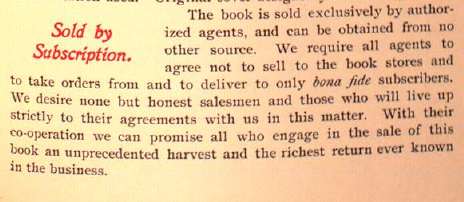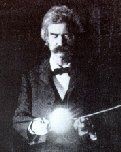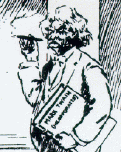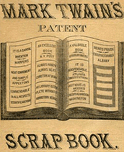

|
It's likely that when MT was first contacted by Elisha Bliss about publishing a book, he didn't know what "sold only by subscription" meant. But the success of Innocents Abroad soon made him an enthusiastic advocate of the system. "Anything but subscription publication," he once wrote Howells, "is printing for private circulation." "Sold only by subscription" meant that during most of MT's lifetime his contemporaries didn't buy his new book in a bookstore, but rather from a sales agent who called at their home or workplace with a bound prospectus and a prepared spiel. There were tens of thousands of these agents going door-to-door through the villages, towns and cities of America during the heyday of the system, which coincided with the first twenty-five years of MT's career. Commentators on subscription publishing often assume that the average agent was a Civil War veteran, but the few references to specific agents I've seen suggest that many of them were women (see also Adventures of a Woman Book Agent). Selling MT's books by subscription meant that they cost about three times as much as comparable trade books. You can see this vividly by comparing the price quoted in the Webster & Co. ad for the subscription edition of Life on the Mississippi with the price in an ad for the Harpers' trade edition that came out just two years later. Subscription prices enabled MT to make a lot more money from his popular works, but when Bliss included a defense of the cost of subscription books on the back pages of Tom Sawyer he didn't mention profit. 
"Sold by subscription" meant that MT's books were aggressively marketed. Subscription publishers talked about canvassing agents the way Hank Morgan describes the knights he sends through Arthur's kingdom, as "missionaries of civilization," bringing to small towns and remote districts the light of the word -- that is, of a great many words, for subscription books needed to be long to help justify their price. Most trade publishers, and many other writers, attacked the system as a mercenary debasement of literature into mere business. According to Nathaniel Hawthorne's son Julian, agents were "trained to talk a man into a state of imbecility, and then, under guise of giving him something he does not want, to rob him of his money." To MT this sales method largely defined his audience: "When a subscription book of mine sells 60,000," he wrote Henry Rogers, "I always think I know whither 50,000 of them went. They went to people who don't visit bookstores" (see also Identifying MT's Audience). It also had a great deal to do with shaping his art. His genius enabled him in many ways to transcend the terms of the system: his Gilded Age, for example, was the first subscription novel. But in other ways his imagination remained captive to the circumstances of selling books door-to-door. "A well-made novel," "an original work of art" -- these weren't slogans agents could use to convince a potential customer to pay $4.50 for a book when the average daily wage was less than $2.00. "Nearly 700 pages . . . and a laugh on every page" (as agents were instructed to promise buyers of Following the Equator) -- that was the kind of thing MT and his publishers assumed the reader who bought a book "by subscription" was looking for. As MT's career went on, he found additional ways to sell his books. When he started up his own firm, he never hesitated about making it a subscription company. Its first marketable commodity was Huck Finn, and in marketing it MT had Webster follow the techniques of Bliss's company. But he also hoped to secure at least 40,000 subscribers by December, 1884, so that he could publish by December 15, and then "dump" thousands of additional copies into bookstores in time to catch the holiday trade. When someone defaced Huck's prospectus, publication had to be postponed until the start of 1885, but by the summer of that year you could buy the novel in stores. By the 1890's, the subscription system was on its way out. Harpers, an established trade publisher, took over the sales of his earlier books. Yet much of MT's success as a writer, and many of his weaknesses, were equally the product of that system. 
|


